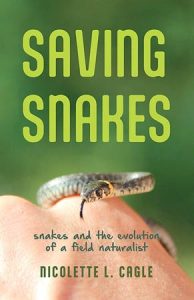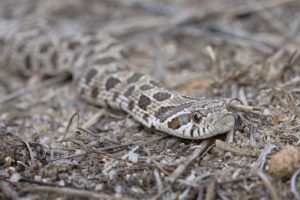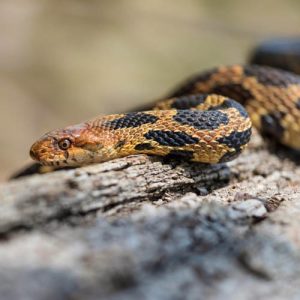Book Review: The Serpent Beguiled Me
Nicolette L. Cagle, Saving Snakes: Snakes and the Evolution of a Field Naturalist (University of Virginia Press, 2023)

 Ever since the Garden of Eden, humans have reviled snakes. Ask almost anyone which animals they fear, or just get the creeps thinking about; snakes will top the ranks alongside spiders. The results have often been disastrous for snakes. That’s why Duke professor and ecologist Nicolette Cagle sets out to help us understand why we should admire snakes as she does and how they have shaped her entire career and understanding of natural history. In Saving Snakes: Snakes and the Evolution of a Field Naturalist, Cagle tells the story of this underappreciated reptile through the lens of her own life and experiences in the field, like meeting the gaze of a Black Racer in the coastal plain of North Carolina or the fangs of a Northern Watersnake on Lake Michigan. Cagle’s easy-going, relatable voice and clear explanations of complex scientific topics — like how snake venom works or her snake surveys in north-central Illinois — make this intimidating subject as pleasant to digest as a mouse is for a Corn Snake.
Ever since the Garden of Eden, humans have reviled snakes. Ask almost anyone which animals they fear, or just get the creeps thinking about; snakes will top the ranks alongside spiders. The results have often been disastrous for snakes. That’s why Duke professor and ecologist Nicolette Cagle sets out to help us understand why we should admire snakes as she does and how they have shaped her entire career and understanding of natural history. In Saving Snakes: Snakes and the Evolution of a Field Naturalist, Cagle tells the story of this underappreciated reptile through the lens of her own life and experiences in the field, like meeting the gaze of a Black Racer in the coastal plain of North Carolina or the fangs of a Northern Watersnake on Lake Michigan. Cagle’s easy-going, relatable voice and clear explanations of complex scientific topics — like how snake venom works or her snake surveys in north-central Illinois — make this intimidating subject as pleasant to digest as a mouse is for a Corn Snake.

Corn Snake
Photograph courtesy of Richard Stovall (cc-by) https://www.inaturalist.org/observations/71328107

Plains Hognose Snake
Photograph courtesy of Caleb Krueger (cc-by)
https://www.inaturalist.org/observations/131945085
Cagle makes it evident that ecology is one of the most interdisciplinary fields. Saving Snakes not only details Cagle’s personal and career journey, but also follows the history of changing land use in the United States and humans’ relationship with the natural environment as it relates to snakes. Cagle provides rich context for the sites and people she describes, including histories of Indigenous land stewardship, forceful displacement of Indigenous peoples by European colonizers, and the legacy of slavery in the southeastern U.S. For Cagle, such content and context is crucial to understanding the ecology of these regions.

Eastern Fox Snake
Photograph courtesy of joshl (cc-by)
https://www.inaturalist.org/observations/167458191
Using extensive evidence from research and firsthand encounters, Cagle challenges longstanding misconceptions about snakes. Affectionate descriptions of the snakes Cagle has met, like the “downright adorable” Plains Hognose Snake or fox snakes “that seemed to smile,” also help paint these creatures with a fresh perspective.
Far from a detached report on the ecological benefits of snakes, Cagle makes herself open and vulnerable, describing her emotions while navigating a difficult field. Her joy of finding snakes in the field and sadness and anger when encountering snakes harmed by humans (intentionally and unintentionally), like a Plains Garter Snake mother and babies carelessly run over by a car, are palpable throughout. Even after all of the pain and conflict between humans and snakes that she has witnessed, Cagle remains hopeful for the future of herpetology and ecology.
Overall, Saving Snakes challenges us to confront our own preconceived notions and behavior toward snakes. Cagle’s book is an ideal introduction to the world of field herpetology and will likely convince you that snakes are not our enemies, but amazing creatures worthy of our attention, respect, and awe.
 RCC Stanback Presidential Fellow – Emma Brentjens
RCC Stanback Presidential Fellow – Emma Brentjens
Emma Brentjens is a Master of Environmental Management student at Duke University studying Ecosystem Science and Conservation and Community-based Environmental Management. She is driven by her belief that science is for everyone and aspires to write about environmental topics in an accessible and engaging way.






